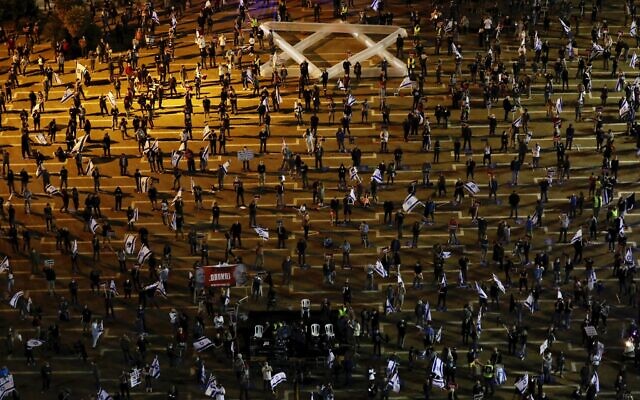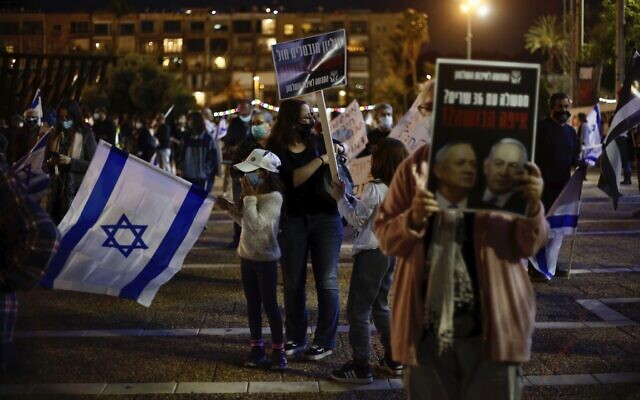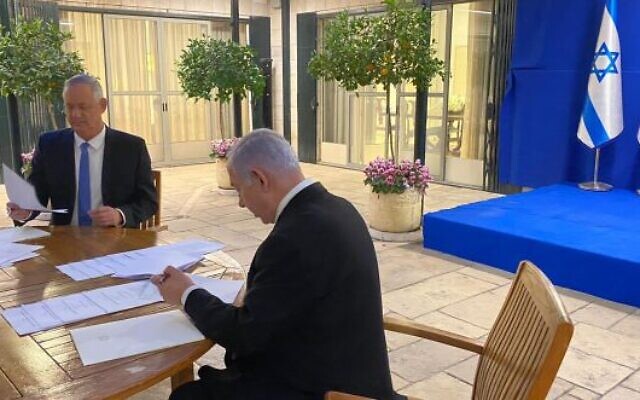High Court set to hear petitions Sunday against MK under indictment, like Netanyahu, forming a government, and against alleged illegal elements in the deal

An estimated 1,000-1,500 Israelis took to the streets in Tel Aviv on Saturday night, demonstrating against Prime Minister Benjamin Netanyahu’s new coalition deal with his chief rival a day before the High Court of Justice is to begin debating a series of legal challenges to the agreement.
Demonstrators gathered for the third consecutive weekend in Tel Aviv’s Rabin Square, standing more than two meters (six feet) apart in organized rows to conform with social-distancing rules to protect against the spread of the coronavirus.
Netanyahu last month reached a power-sharing deal with his chief rival, Benny Gantz. Protesters are upset that the deal leaves Netanyahu in power as he prepares to go on trial for corruption charges.
“Shame! Shame!” chanted the protesters. One of the posters showed a picture of Netanyahu and Gantz with the slogan, “We Say No to a Corruption Government.”
Under the deal, Netanyahu and Gantz agreed to share the premiership, with Netanyahu serving as prime minister the first 18 months and Gantz serving the next 18 months. It also includes a clause allowing Netanyahu to advance plans to annex parts of the West Bank, including Israeli settlements, starting July 1.

Saturday’s protest was organized by the Movement for Quality Government in Israel, one of the advocacy groups that has filed a legal challenge to the top court. Smaller protests were also taking place in other cities across Israel.
The groups are asking the High Court to ban any indicted politician, including Netanyahu, from being allowed to form a new government. They also say that parts of the coalition deal are illegal.
A former Supreme Court deputy president, Elyakim Rubinstein, said on April 23 that, “the coalition agreement is shocking to a jurist, because it contains so many legal monstrosities. Someone who respects the concept of Basic Laws, who sees in them a constitutional text, can’t possibly like this.” Israel’s quasi-constitutional Basic Laws, he said, “are being trampled as if they were a sewage bylaw of the Ra’anana municipality.”

If the court strikes down the coalition deal, Israel could be plunged into a fourth consecutive election in just over 12 months.
The court is to start its deliberations on Sunday morning, with the first day reportedly set aside for the issue of whether an indicted MK, such as Netanyahu, is legally permitted to form a new government. The court is to livestream its deliberations.
The Knesset on Thursday approved in its first reading a bill that seeks to enshrine in law the power-sharing deal between Netanyahu and Gantz, which would see the two rotate the premiership.
The proposal still requires two more plenum votes. It cleared its first legislative hurdle with 72 lawmakers supporting it and 31 opposing. It will be discussed and revised at a special Knesset committee headed by Blue and White MK Eitan Ginzburg before coming back to the plenum floor for its final two votes.
Attorney General Avichai Mandelblit, the official who indicted Netanyahu, told the court in a submission Thursday that there is no legal obstacle to Netanyahu forming and leading the next government despite the criminal charges against him.

“Despite the significant difficulties that arise in this matter, they do not constitute grounds for judicial intervention,” Mandelblit wrote with regard to the bribery, fraud and breach of trust charges that he himself in January filed against Netanyahu in three cases.
The prime minister faces seven counts of three criminal charges: fraud and breach of trust in Cases 1000 and 2000, and bribery, fraud and breach of trust in Case 4000. Netanyahu denies the charges and claims he is the victim of an “attempted coup” involving the opposition, the media, the police and the state prosecution.
His trial was pushed off by two months just two days before its scheduled March 17 opening hearing, after Justice Minister Amir Ohana declared a “state of emergency” in the court system in light of the coronavirus pandemic.
The courts administration announced last week that in the wake of an easing of coronavirus restrictions, it would be expanding its activities from May 3, meaning there was no longer an impediment to starting Netanyahu’s corruption trial.
As reported by The Times of Israel
